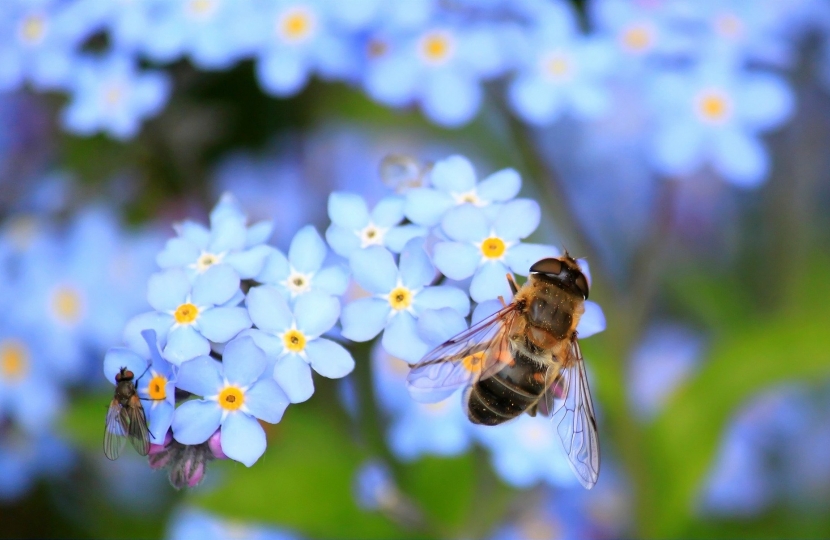
National Pollinator Strategy
Pollinators are an essential part of our environment and play a crucial role in food production through pollination. The National Pollinator Strategy, published in 2014, is a ten year plan which sets out how the Government, conservation groups, farmers, beekeepers and researchers can work together to improve the status of the approximately 1,500 pollinating insect species in England.
It includes dealing with habitat loss and the potential harm from pesticide use, invasive species and climate change. I am pleased that the UK's future agriculture policies will help to improve biodiversity and support habitats for pollinators, building on existing agri-environment measures to enable many more farmers and land managers to take positive action.
Our world-leading Environment Act committed us to halt the decline of species by 2030. This Action Plan is going to work alongside that commitment. I want to see bigger and better flower-rich habitats to support pollinators across the country; healthy populations of pollinators which are resilient to threats including climate change; no further extinctions; awareness of the needs of pollinators and real action to support pollinators
Neonicotinoids
The Government continues to support the restrictions on neonicotinoids to protect pollinators, and emergency authorisations for pesticides are only granted in exceptional circumstances where diseases or pests cannot be controlled by any other reasonable means. These emergency authorisations can provide short term availability of a product if the applicant can demonstrate that this addresses a danger which cannot be contained by any other reasonable means, that the use will be limited and controlled and that the necessary protection of people and of the environment can be achieved.
Emergency authorisations are also used by countries across Europe, 10 EU countries including Belgium, Denmark and Spain have granted emergency authorisations for neonicotinoid seed treatments since 2018. Under EU legislation, Member States may grant emergency authorisations in exceptional circumstances. The UK’s approach to the use of emergency authorisations has not changed as a result of the UK’s exit from the EU.
Cruiser SB
The British beet sugar industry applied for this emergency authorisation following the extreme and unprecedented impact of Virus Yellows disease, which is spread by aphids, on the 2020 sugar beet crop.
At least 40% of the crop nationally was affected, and overall yields for the 2020/21 ‘campaign’ (harvest) are down approximately 25% on the five-year average. Some individual growers in the worst impacted regions have sadly seen their yields destroyed by as much as 80% as a result of Virus Yellows this season. The derogation was very much a last resort.
Conditions attached to the emergency authorisation
The application for the use of Syngenta’s Cruiser SB on the 2021 sugar beet crop is for England only and the duration of authorisation is strictly limited to the period required to allow supply of the product. Furthermore, sugar beet is a non-flowering crop that is only grown in the East of England.
This exceptional use of Syngenta’s Cruiser SB will be strictly controlled and conditions of the authorisation include reduced application rate as well as a prohibition on any flowering crop being planted in the same field where the product has been used within 22 months of sugar beet and a prohibition on oilseed rape being planted within 32 months of sugar beet.
Sugar beet is a non-flowering crop, therefore not attractive to bees. The Department for Environment, Food and Rural Affairs have deemed that, with the mitigation measures in place, “…the risks are acceptably low enough that the benefits outweigh them”. You can read Defra’s full statement at: https://www.gov.uk/government/publications/neonicotinoid-product-as-seed-treatment-for-sugar-beet-emergency-authorisation-application/statement-on-the-decision-to-issue-with-strict-conditions-emergency-authorisation-to-use-a-product-containing-a-neonicotinoid-to-treat-sugar-beet.
This targeted treatment is applied to the sugar beet seed before it is sown, rather than being a spray. The seed is distributed directly to growers through seed orders placed with British Sugar. Growers will be required to follow herbicide programmes to minimise the number of flowering weeds in treated sugar beet crops. British Sugar have also proposed a stewardship scheme which includes several measures to address risks to pollinating insects.
Alongside NFU Sugar and the British Beet Research Organisation, British Sugar are rapidly progressing their plans to tackle Virus Yellows in the long term, without the need to use neonicotinoids. This will prevent emergency authorisation becoming a common occurrence and preventing the UK from returning to routine application of neonicotinoid pesticides. Work to tackle Virus Yellows in the long term includes:
- An extended programme of research and development on Integrated Pest Management
- Working with plant breeders to improve natural resistance in the crop
- Non-chemical approaches, such as boosting beneficial insects, cover crops, maintaining good farm hygiene
